Summer is over.
It’s around that time of the year when the weather becomes pretty unfriendly due to the prolonged cold days and all the boredom indoors.
Not all people complain though.
The hunters have doubtlessly been looking forward to this season not only because of the excitement that the woods bring, but also the various wild delicacies that it comes with.
You see, one of the reasons why wild meat is so appealing to us, the hunters, is that we get it fresh and natural minus all the chemicals that prepackaged and pre-shaped domestic meat come with.
More...
If you are excited about this season and the wild meat, this article is yours.
Today, I have several things that you might want to keep in mind when cooking in the wild.
And, if you are curious about how to make the wild game to the masterpiece, visit Savoury Table, a website that provides all the information you need about BBQ, grilling, smoking and more.
First off,
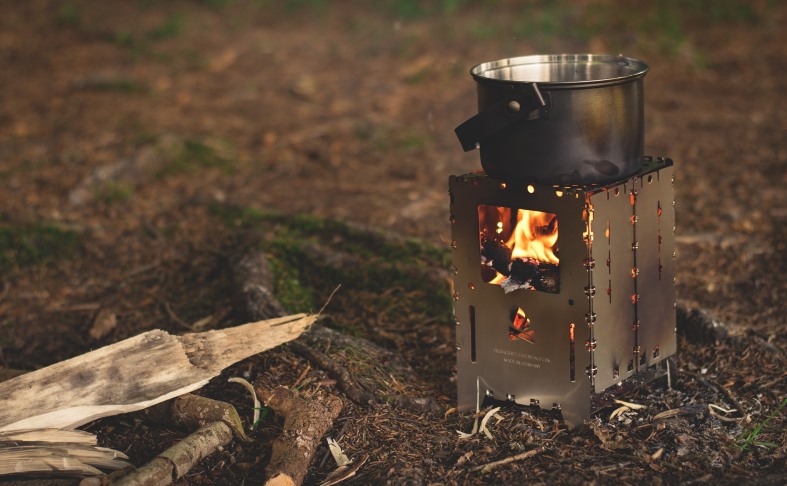
Know What Animal to Go for
Before slithering into the woods and aiming your arrow towards any animal that comes in sight, ensure that it’s lawful.
The first thing that you’ll want to understand is the type of species that are in season in your State.
Hunting laws dictate the type of animals to hunt each season.
Going for the wrong animals could change your hunting trip into an unwanted legal disaster. You don’t want that.
So, be sure to confirm with your State’s hunting laws to know what species are on season.
What Things Do You Consider When Cooking in the Wild?
Unlike preparing food in your kitchen, meat harvested from the woods requires a different approach. Wild meat can be delicate at times, and just a little mistake could spoil the entire delicacy. So, what are those little things that need to put your eyes on?
1. Know How to Dress the Meat
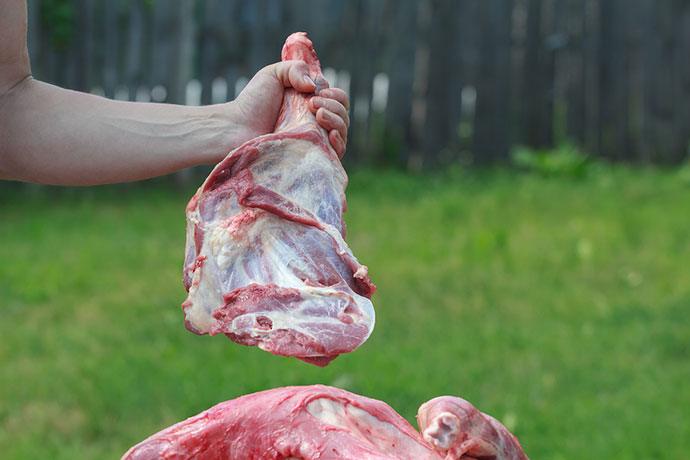
One thing that an experienced hunter will always tell you is that preparing wild game starts at the point of harvest.
There is more to shooting and putting the game on fire.
You need to ensure that the meat does not get contaminated.
Worth pointing out is that this could happen anytime when dressing, transporting, storing, or cooking the meat.
2. Dressing Should Be FAST
Any game, be it venison, turkey, deer, or pheasant should be dressed as soon as possible.
Doing this helps in ensuring rapid heat loss and preventing the breeding of bacteria and other harmful micro-organisms on the carcass.
Quick dressing also helps in maintaining the quality of the game.
Again, it also makes ferrying bulky animals from the hunt area to the camp or to your truck lots easier.
When dressing, make sure to remove all dirt, shot pellets, feathers, bone fragments, and anything else that might cause contamination.
3. Slice Your Game Right
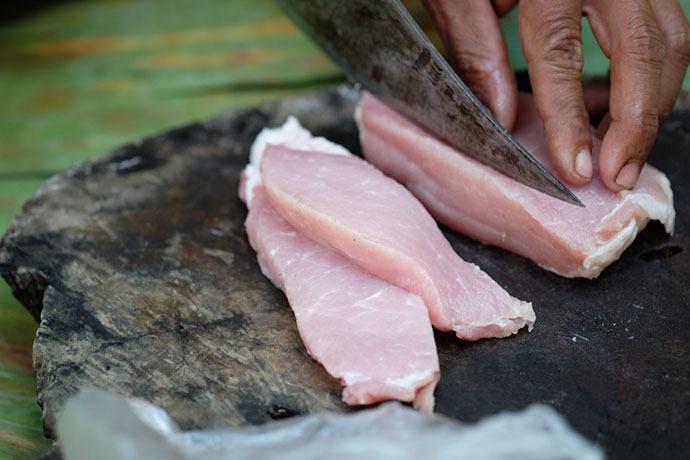
There’s no ‘BEST’ way to slice your game. However, it’s important that you understand the primary muscle groups.
To breeze through the butchering process and to enhance your safety, you need to have a sharp knife and a high-quality sharpener to keep the knife top-notch throughout the process.
Importantly, this is your time to become the king of the woods. Choose what cuts become chops, steaks, burger, and roasts.
Worth mentioning is that the big game has an external fat that is strong-tasting and tallow. It’s, therefore, important to remove the fat before cooking.
Again, for tough cuts, the best way to tenderize them is by marinating them either in a packaged beef marinade or a mixture of wine and oil.
4. Cooking Your Meat
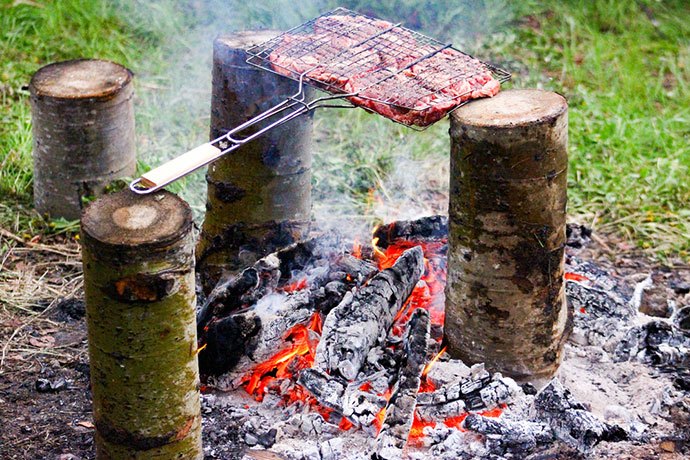
As a hunter, you must know by now that wild meat packs lots of flavors but has low fats and calories.
However, compared to domestic meat, cooking game can be really challenging. As such, you need to have ideal cooking recipes for your game.
While you could still use spices for the game, professional hunters and chefs argue that these add-ons tend to hide the real quality of the wild meat.
However, you might want to add some salt crystals or smoked salt to your ingredients.
When used in game preparation, these salts add additional flavors that don’t take the natural flavors of the game away.
Again, these salts are big and crunchy than regular table salt and, therefore, make your dish even tastier.
5. Rare to Well Done or Just Pink
Most wild animals have very lean meat.
What this means is that if you opt to overcook it, it won’t withstand the cooking as it might be the case with most domestic meat.
Overcooked wild meat (safe for bear) often results to dry and hard meat which is, in most instances, barely edible.
As such, the most recommendable way of coking game is by leaving it pink (cooking it to medium). This ensures that you don’t eliminate its juiciness.
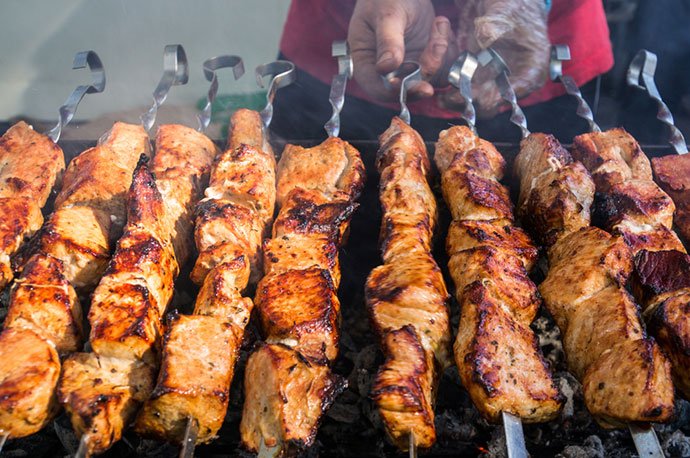
This cooking method does not suffice for all animals though.
Some white meats such as rabbit and pheasant should be cooked thoroughly to prevent the chances of tapeworms being on your menu.
How Do You Cook Your Wild Harvested Meat Without Overcooking It?
You might want to try the Sous Vide cooking machine.
What this tool does is that it holds a water bath at a precise temperature thereby eliminating the risk of overcooking your meat.
With this technique, the water is heated to a predetermined temperature first.
The meat is then sealed in an airtight bag and submerged in the bath.
This means that the meat will be cooked at the temperature of the bath.
It won’t be overcooked since it can’t exceed the temperature of the water. So, it retains its natural juices and flavors.
6. Pack and Stack It Correctly
It’s very likely that you won’t eat the whole animal in one sitting especially for the big game.
Some meat might last several weeks after a kill.
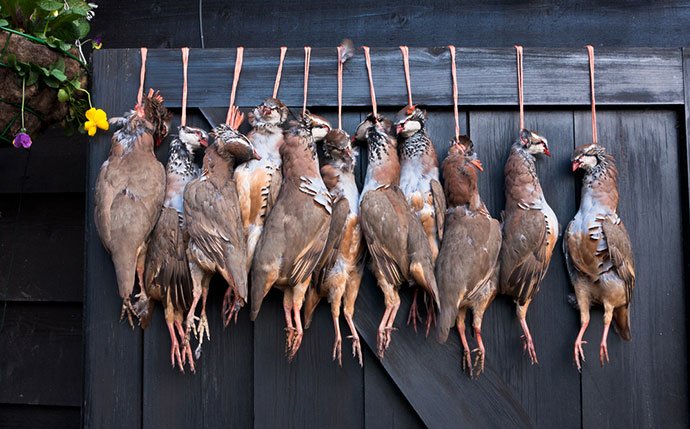
The good thing is that wild game becomes tastier with age.
However, aged meat could also land you in hospital if not properly handled.
It all starts with packaging.
How much you put in each pack depends on your eating habits and the number of people.
For a single person, half-pound allotments might be ideal.
Once you’ve portioned your meat, pack it in freezer papers and label them with the type of cut and date and throw them in the freezer for another day.
Conclusion
Wild meat is way delicious than domestic meat.
However, it all depends on how you treat your catch from shooting to storing. Be sure to arm yourself with some of these tips before heading to the woods.
Best wishes!
